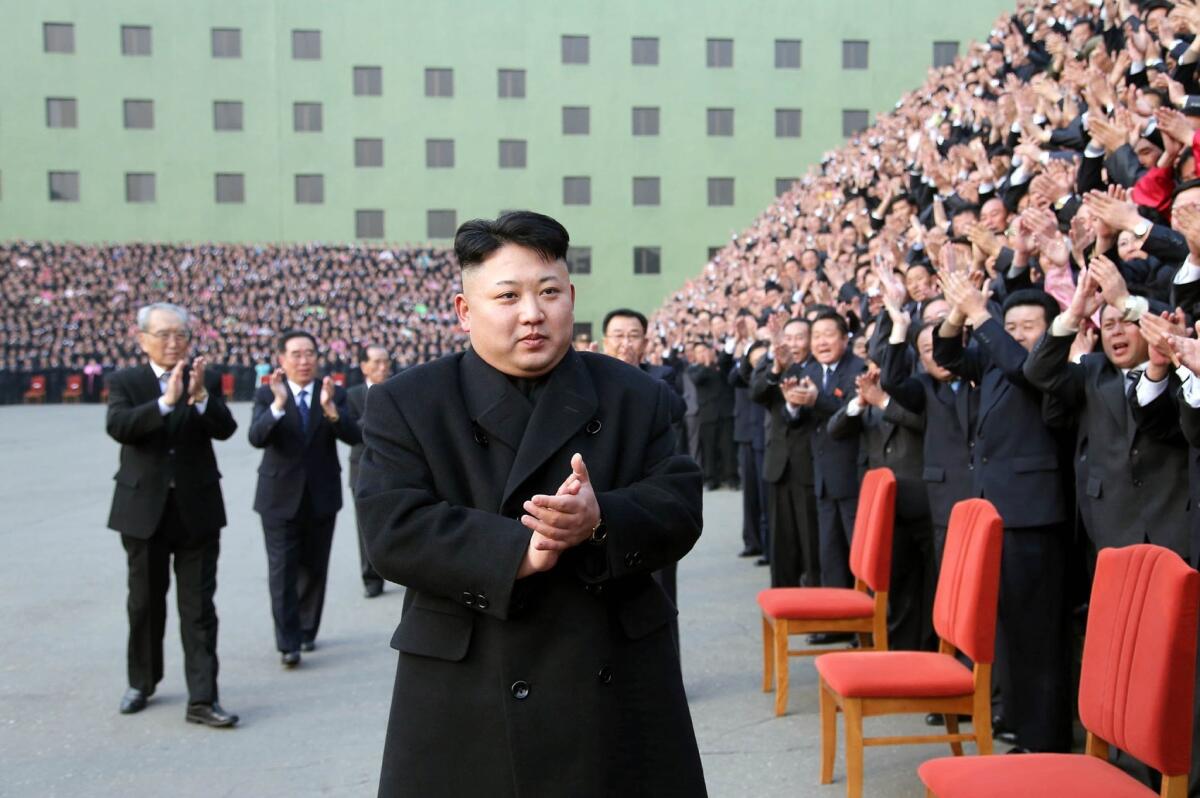North Korea 2014 meets Rome AD 65

- Share via
This week, as the Ides of March approaches — the March 15 anniversary of the assassination of Julius Caesar, a determined but ultimately fruitless attempt by Roman senators to stop their government from sliding toward dictatorship — the minds of some ancient historians may turn in a seemingly unlikely direction: toward modern North Korea.
The dark and menacing regime of Kim Jong Un seems a long way off from the Augustan “Golden Age” of ancient Rome, an era that produced art and literature still admired today. The differences between the two societies are, of course, vast, but the parallels are nonetheless striking. In the century or so following Caesar’s assassination, his successors achieved a power so absolute that they were worshiped as gods on Earth, as the Kims are today. Yet they, again like the Kims, suffered chronic insecurity about their legitimacy, and that fear led to terrible abuses.
Hereditary rulers who are not kings — who have no long tradition or constitutional authority behind them — are somewhat exotic creatures in the annals of history. They often invent new titles to describe their role in the state: Princeps, or “first citizen,” in the case of the Caesars, Supreme Leader (and variants of that term) in that of the Kims. They need to foster a cult of personality to take the place of scepters and crowns, and the loyalty of their military — the Praetorian Guard in Rome; the People’s Army in Pyongyang — must be prominently displayed. They show deep anxiety over succession and transfers of power, as though sensing that any hesitancy or weakness in such moments may bring a crisis.
PHOTOS: A peek inside 5 doomed dictators’ opulent lifestyles
When Kim Jong Il died in December 2011 and his son Kim Jong Un took over, Oxford classicist Alison Rosenblitt noted how closely the regime’s rituals tracked those of the Caesars in AD 14. The secrecy surrounding the death of Julius’ adopted son Augustus; the accession of Augustus’ stepson, Tiberius; and the tightly managed rituals of mourning and burial seemed to parallel one another, step for step and day by day, across two millenniums.
To observe the Kims’ transfer of power, Rosenblitt wrote, was, for an ancient historian, similar to what a volcanologist experiences while watching a live eruption.
Recently, another seismic event in North Korea has borne out Rosenblitt’s comparison. Kim Jong Un’s abrupt execution of his uncle Jang Song Taek in December sent shock waves through the North Korean power structure; in subsequent months Jang’s associates and even his relatives and their children appear to have been similarly eliminated, according to South Korean reports. Kim’s ferocity in turning on Jang, an older man who had been appointed his mentor and advisor, seems uncannily close to the behavior of a Roman forerunner: Nero, the last in the Julian line, who similarly killed his mentor and chief advisor, the philosopher Seneca.
The two purges may have similar roots in the psychology of the men carrying them out. Nero and Kim Jong Un came to power young — Nero at 16, Kim at 28 — and both were “alternates,” succeeding their predecessors only after other heirs apparent fell from favor. Neither had shown, before accession, the temperament or talents that would have fitted them for rule.
Kim’s fascination with NBA stars such as Dennis Rodman recalls Nero’s obsession with chariot racing, so powerful that even as princeps he defied all conventions to compete in the sport himself. Kim’s self-indulgent, party-animal lifestyle resembles that of Nero. Rodman compared Kim’s private pleasure island to resorts like Ibiza, “but he’s the only one that lives there.” Nero favored all-day banquets and drinking parties, interrupted only for dips in snow-cooled swimming pools.
Kim struck down his uncle and No. 2 over a list of elaborate, trumped-up charges that may have masked a real struggle over power and business interests. Nero lashed out at his own senior staffer, a man who had been something close to a father to him.
Seneca had tutored Nero from age 13 and, after his accession three years later, had helped stabilize his rule. But Seneca’s sagacity and self-possession irked a young man who possessed neither quality. As he reached his 20s, Nero grew to hate his former teacher, finally seizing on a pretext in AD 65 to have Seneca killed — then went on to target the man’s relatives and friends, just as Kim is now destroying Jang’s circle.
Nero’s demons also drove him to kill his mother and brother, and, quite possibly, to set the Fire of Rome, a conflagration that consumed nearly two-thirds of the city. Luckily for Romans, his delusions took a more benign turn after the purge of AD 65 and he began performing as a professional musician, until his troops got fed up and deposed him. One can only hope that Kim Jong Un, who thus far has shown a dismaying bellicosity and a fondness for brandishing nuclear weapons, may one day retreat into his passions for movies and video games.
Such parallels remind us, as another Ides of March arrives, of how much was at stake when Brutus and Cassius drew their knives in the senate house in 44 BC. Military-backed autocrats, whether in ancient Rome or modern North Korea, are uniquely able to act out their own psychic torments in purges and vendettas, often making the best men their first victims. From a historian’s viewpoint, the road ahead for Kim Jong Un’s regime looks like a dark one indeed.
James Romm is professor of Classics at Bard College and author of “Dying Every Day: Seneca at the Court of Nero.”
More to Read
A cure for the common opinion
Get thought-provoking perspectives with our weekly newsletter.
You may occasionally receive promotional content from the Los Angeles Times.






